Medical Student Resume Examples

Jul 18, 2024
|
12 min read
Diagnose your potential: How to write a medical student resume that stands out from the crowd. Learn essential tips and avoid common mistakes to ensure your application is just what the doctor ordered.
Rated by 348 people
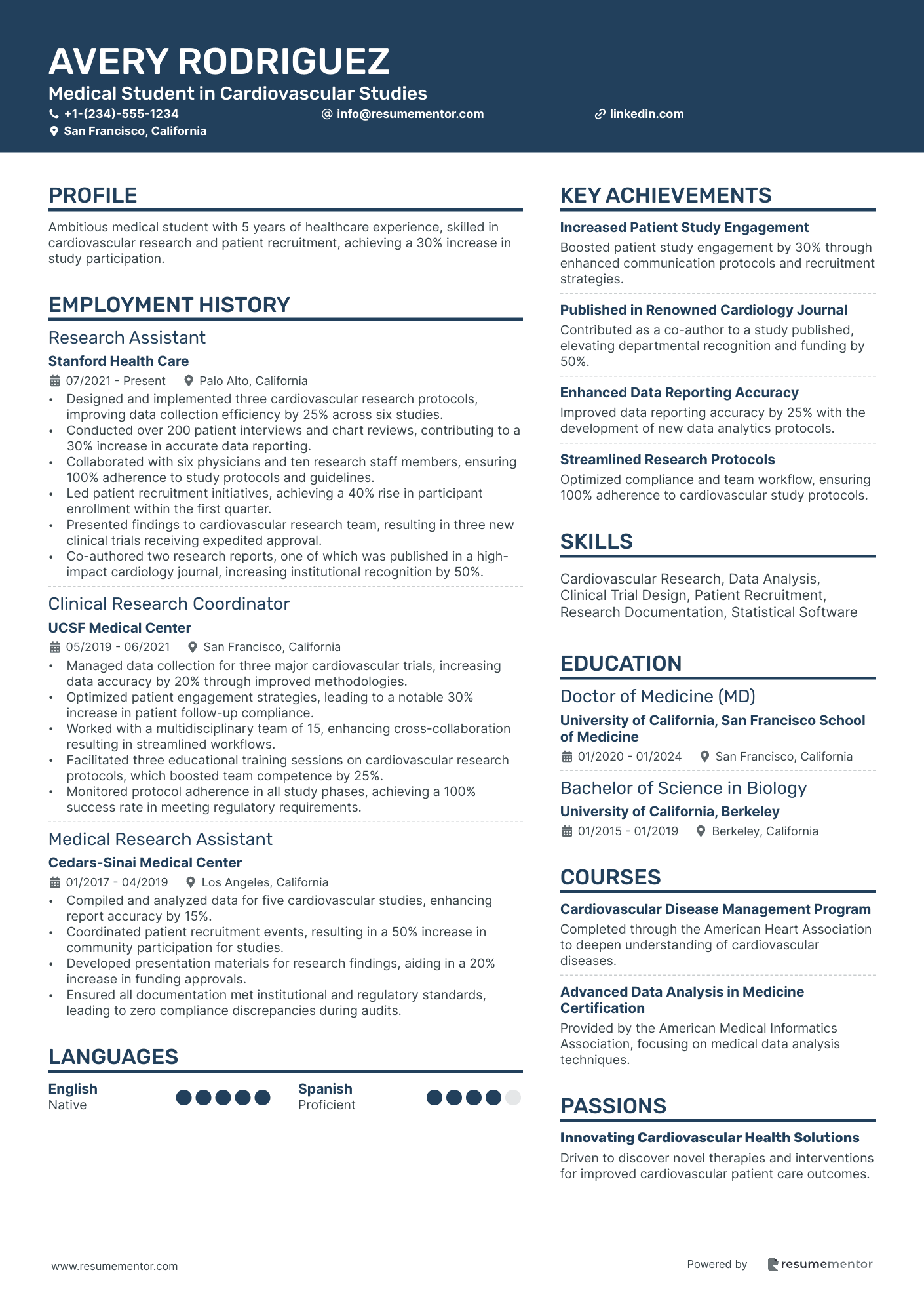
Medical Student in Cardiovascular Studies
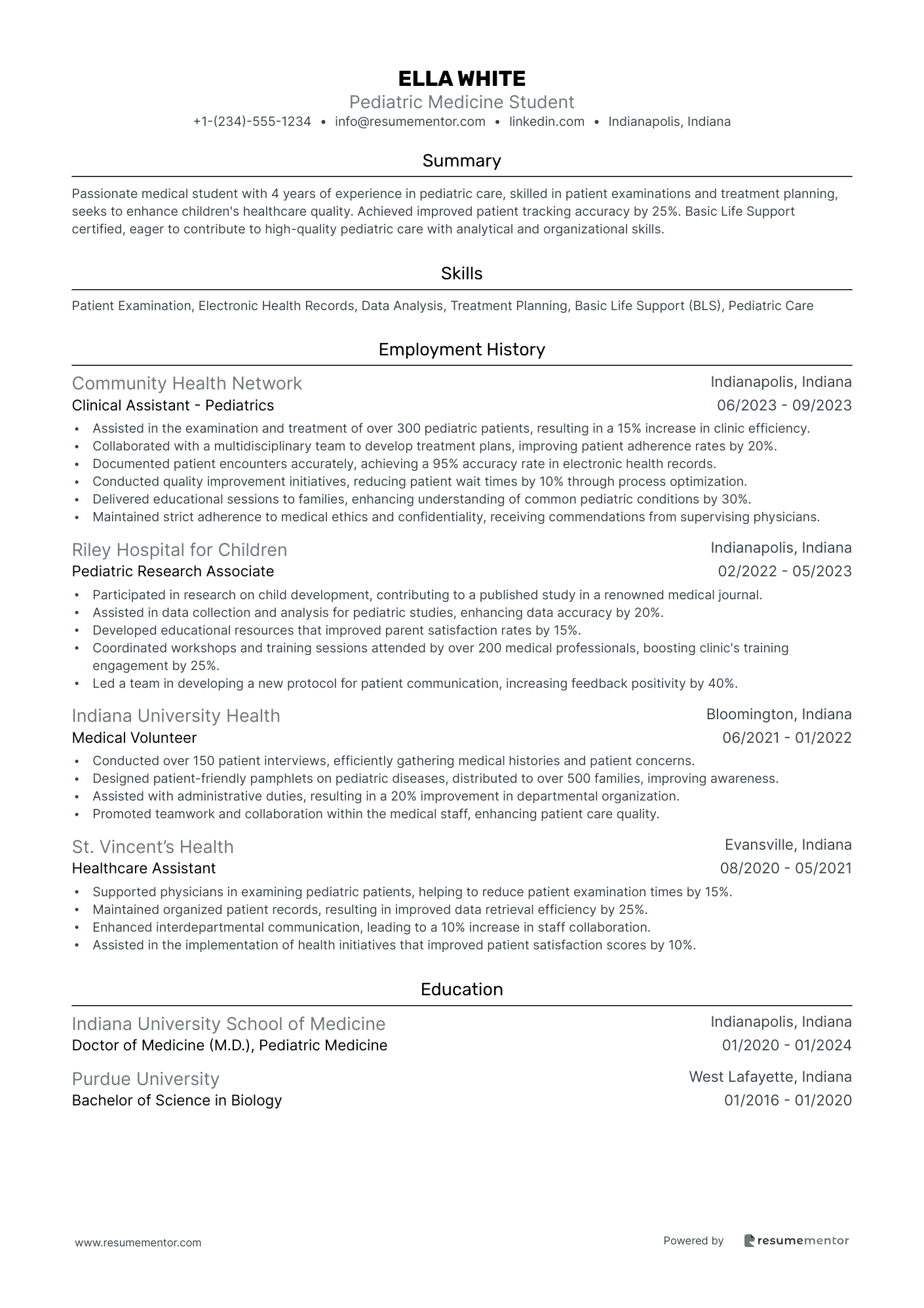
Pediatric Medicine Student
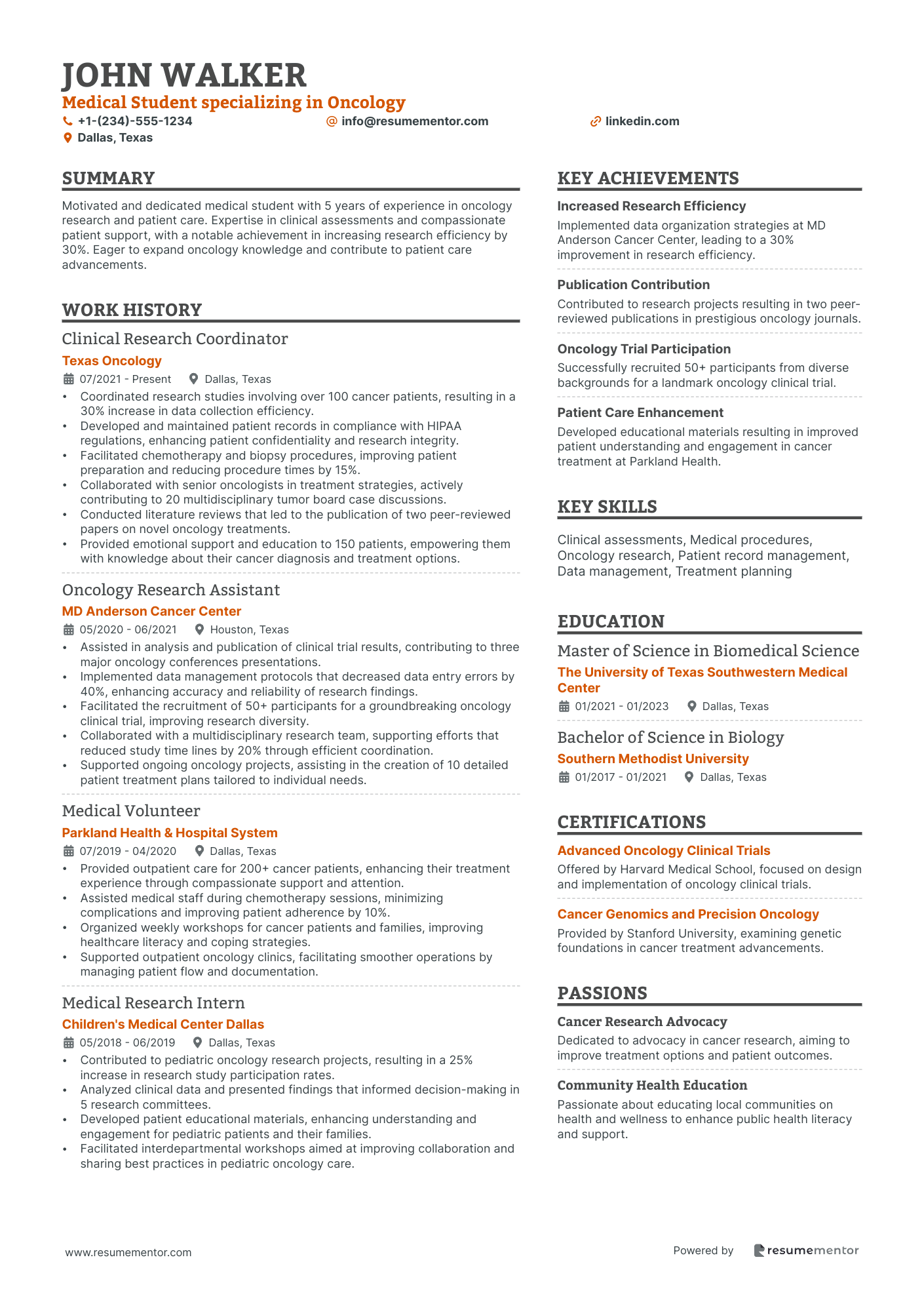
Medical Student specializing in Oncology
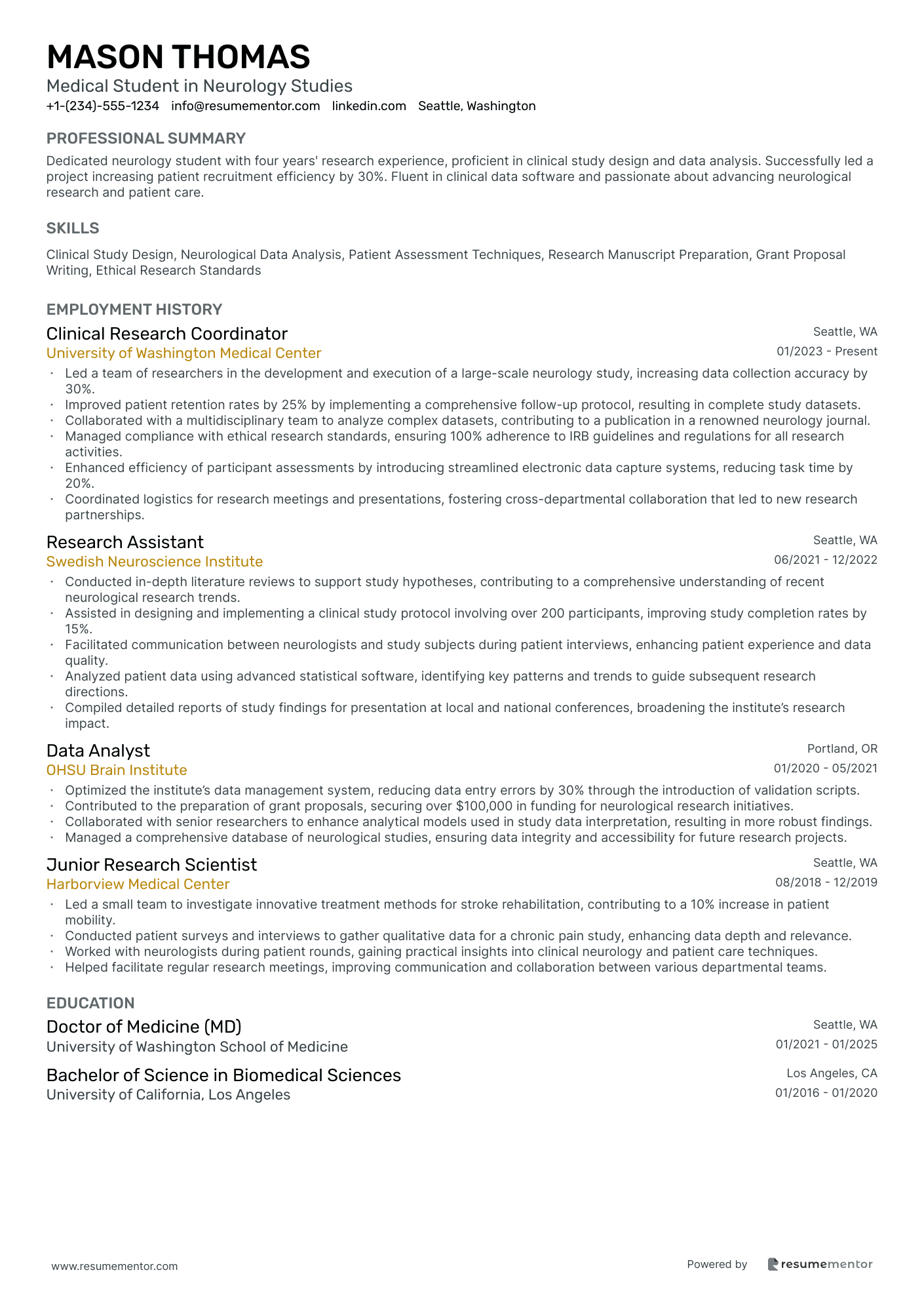
Medical Student in Neurology Studies
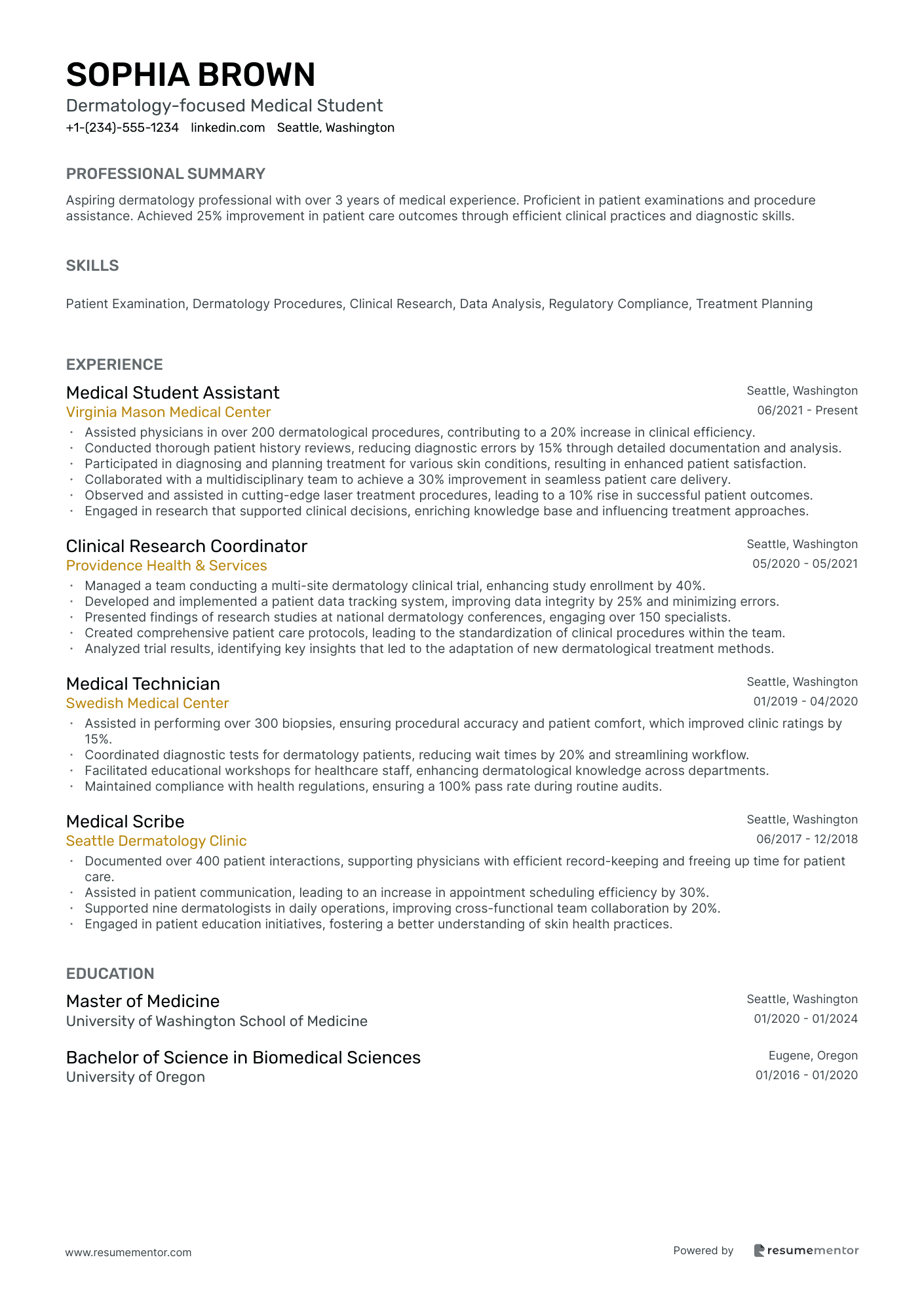
Dermatology-focused Medical Student
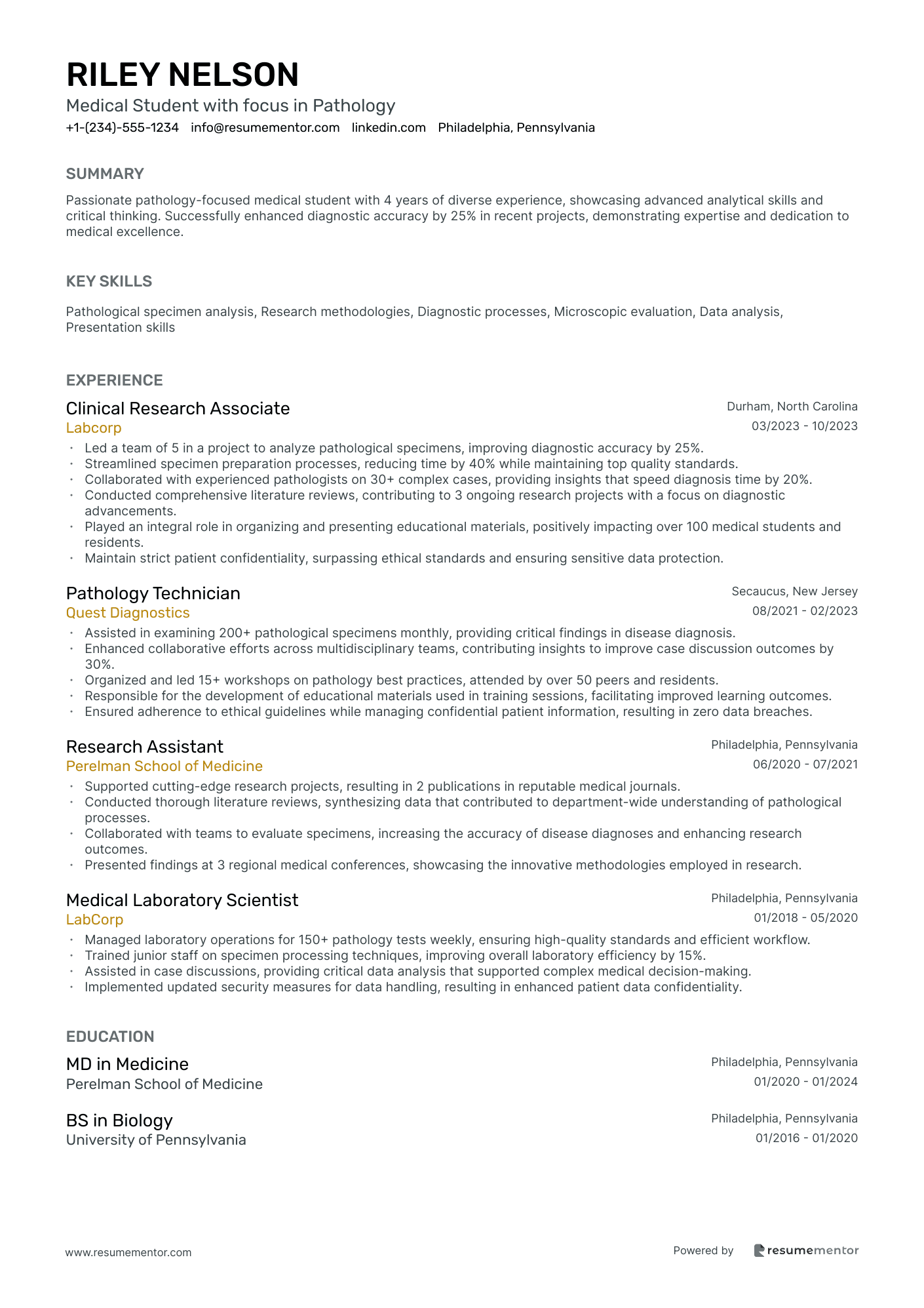
Medical Student with focus in Pathology
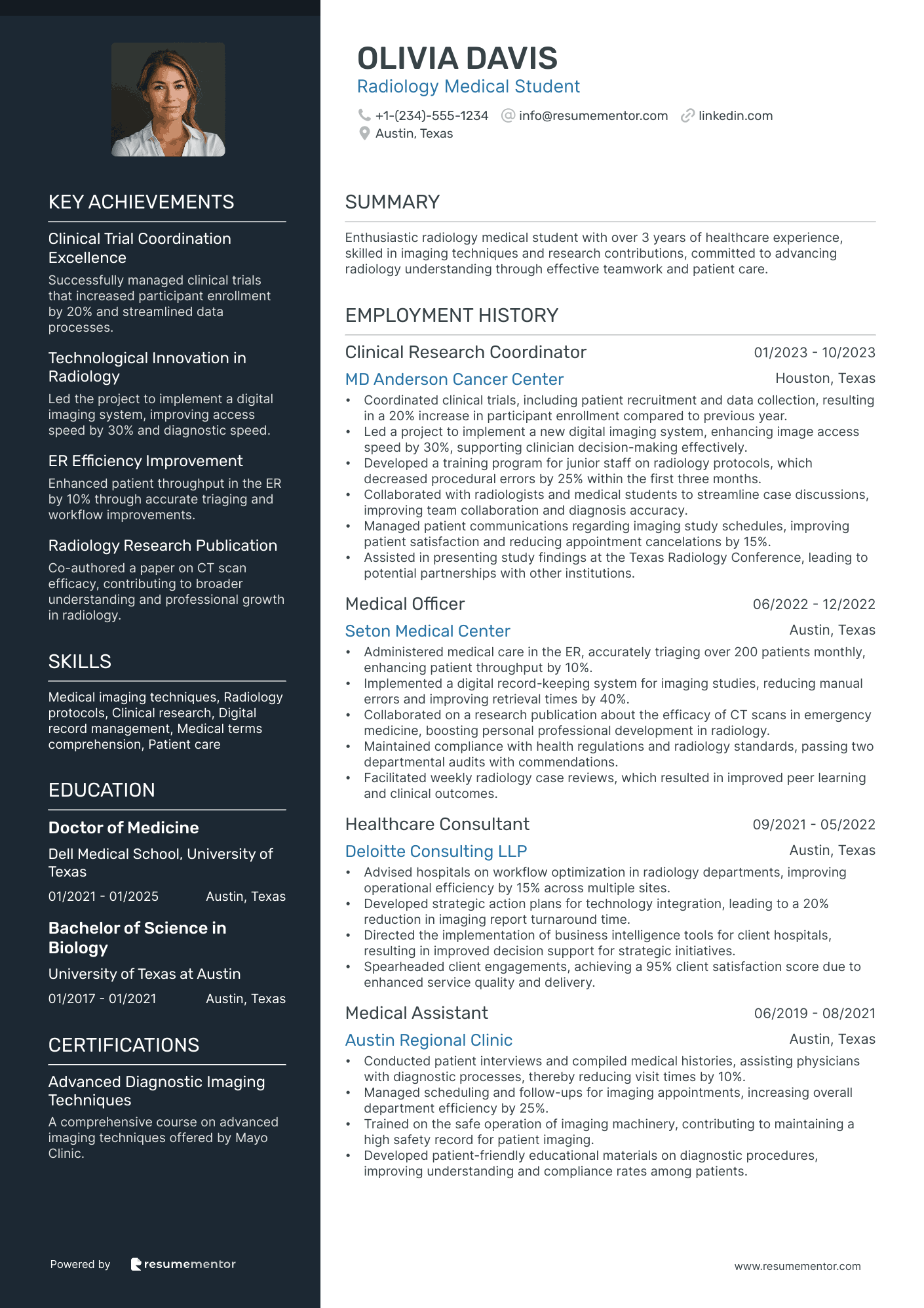
Radiology Medical Student
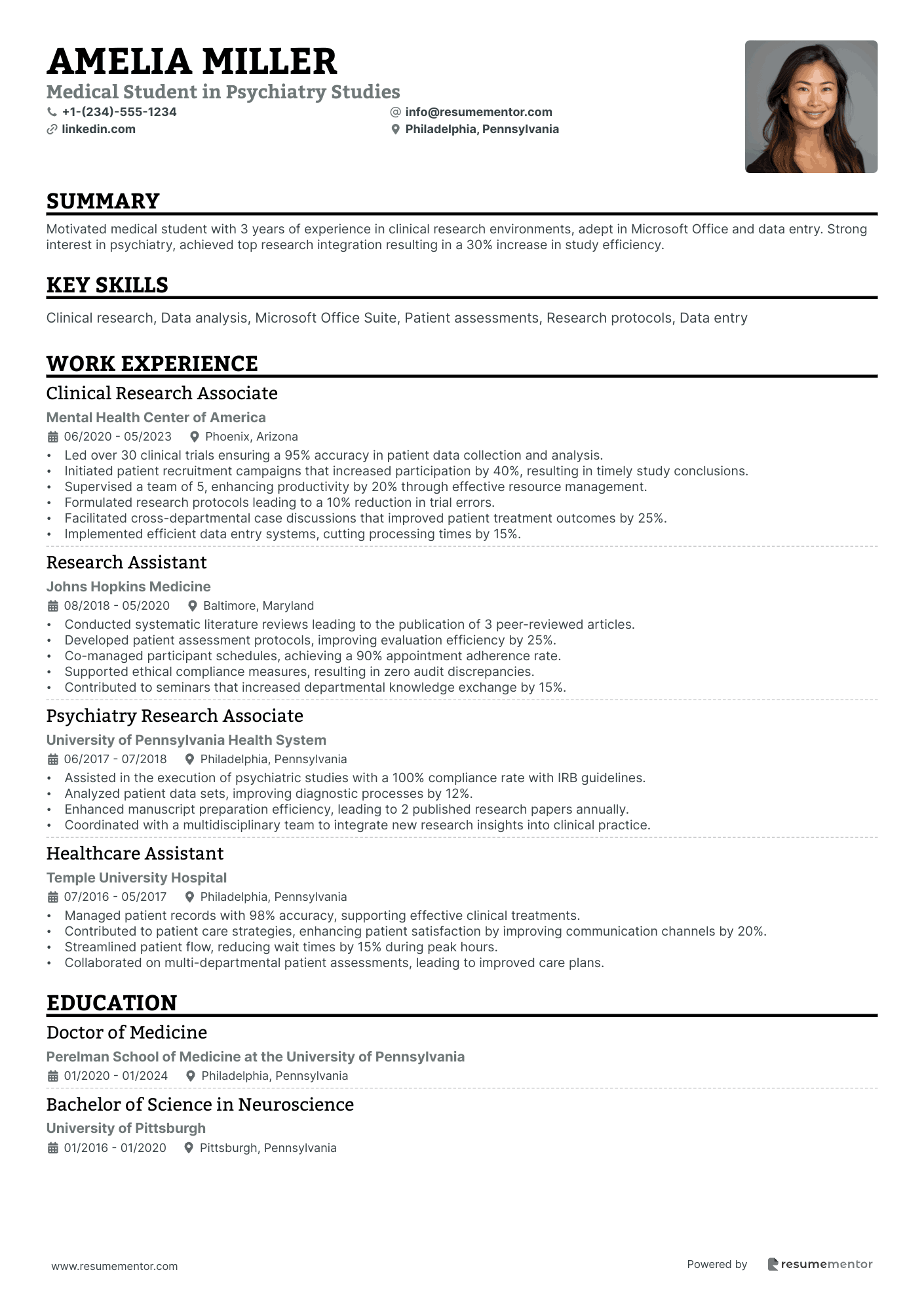
Medical Student in Psychiatry Studies
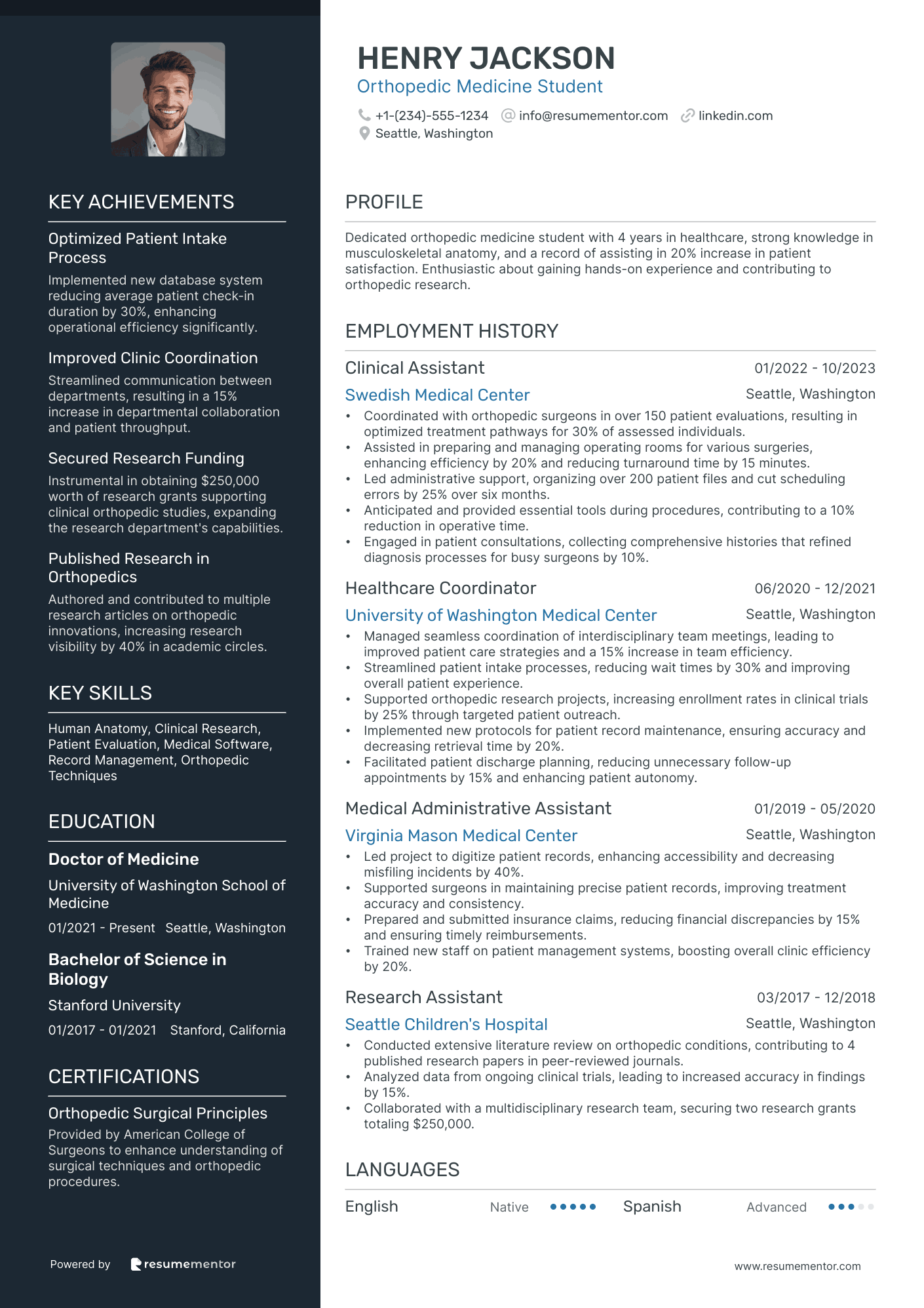
Orthopedic Medicine Student
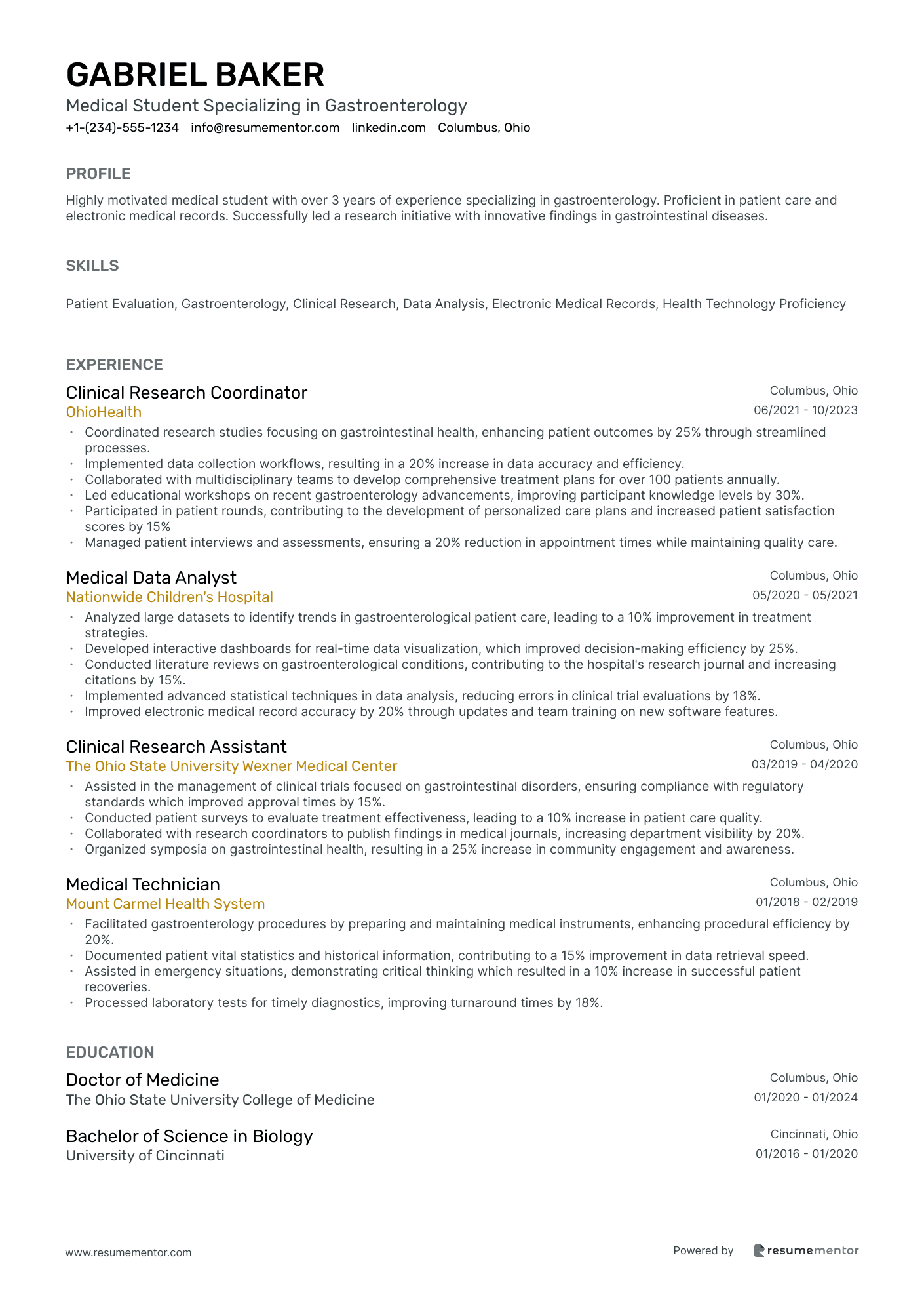
Medical Student specializing in Gastroenterology

Medical Student in Cardiovascular Studies resume sample
- •Designed and implemented three cardiovascular research protocols, improving data collection efficiency by 25% across six studies.
- •Conducted over 200 patient interviews and chart reviews, contributing to a 30% increase in accurate data reporting.
- •Collaborated with six physicians and ten research staff members, ensuring 100% adherence to study protocols and guidelines.
- •Led patient recruitment initiatives, achieving a 40% rise in participant enrollment within the first quarter.
- •Presented findings to cardiovascular research team, resulting in three new clinical trials receiving expedited approval.
- •Co-authored two research reports, one of which was published in a high-impact cardiology journal, increasing institutional recognition by 50%.
- •Managed data collection for three major cardiovascular trials, increasing data accuracy by 20% through improved methodologies.
- •Optimized patient engagement strategies, leading to a notable 30% increase in patient follow-up compliance.
- •Worked with a multidisciplinary team of 15, enhancing cross-collaboration resulting in streamlined workflows.
- •Facilitated three educational training sessions on cardiovascular research protocols, which boosted team competence by 25%.
- •Monitored protocol adherence in all study phases, achieving a 100% success rate in meeting regulatory requirements.
- •Compiled and analyzed data for five cardiovascular studies, enhancing report accuracy by 15%.
- •Coordinated patient recruitment events, resulting in a 50% increase in community participation for studies.
- •Developed presentation materials for research findings, aiding in a 20% increase in funding approvals.
- •Ensured all documentation met institutional and regulatory standards, leading to zero compliance discrepancies during audits.
Pediatric Medicine Student resume sample
- •Assisted in the examination and treatment of over 300 pediatric patients, resulting in a 15% increase in clinic efficiency.
- •Collaborated with a multidisciplinary team to develop treatment plans, improving patient adherence rates by 20%.
- •Documented patient encounters accurately, achieving a 95% accuracy rate in electronic health records.
- •Conducted quality improvement initiatives, reducing patient wait times by 10% through process optimization.
- •Delivered educational sessions to families, enhancing understanding of common pediatric conditions by 30%.
- •Maintained strict adherence to medical ethics and confidentiality, receiving commendations from supervising physicians.
- •Participated in research on child development, contributing to a published study in a renowned medical journal.
- •Assisted in data collection and analysis for pediatric studies, enhancing data accuracy by 20%.
- •Developed educational resources that improved parent satisfaction rates by 15%.
- •Coordinated workshops and training sessions attended by over 200 medical professionals, boosting clinic's training engagement by 25%.
- •Led a team in developing a new protocol for patient communication, increasing feedback positivity by 40%.
- •Conducted over 150 patient interviews, efficiently gathering medical histories and patient concerns.
- •Designed patient-friendly pamphlets on pediatric diseases, distributed to over 500 families, improving awareness.
- •Assisted with administrative duties, resulting in a 20% improvement in departmental organization.
- •Promoted teamwork and collaboration within the medical staff, enhancing patient care quality.
- •Supported physicians in examining pediatric patients, helping to reduce patient examination times by 15%.
- •Maintained organized patient records, resulting in improved data retrieval efficiency by 25%.
- •Enhanced interdepartmental communication, leading to a 10% increase in staff collaboration.
- •Assisted in the implementation of health initiatives that improved patient satisfaction scores by 10%.
Medical Student specializing in Oncology resume sample
- •Coordinated research studies involving over 100 cancer patients, resulting in a 30% increase in data collection efficiency.
- •Developed and maintained patient records in compliance with HIPAA regulations, enhancing patient confidentiality and research integrity.
- •Facilitated chemotherapy and biopsy procedures, improving patient preparation and reducing procedure times by 15%.
- •Collaborated with senior oncologists in treatment strategies, actively contributing to 20 multidisciplinary tumor board case discussions.
- •Conducted literature reviews that led to the publication of two peer-reviewed papers on novel oncology treatments.
- •Provided emotional support and education to 150 patients, empowering them with knowledge about their cancer diagnosis and treatment options.
- •Assisted in analysis and publication of clinical trial results, contributing to three major oncology conferences presentations.
- •Implemented data management protocols that decreased data entry errors by 40%, enhancing accuracy and reliability of research findings.
- •Facilitated the recruitment of 50+ participants for a groundbreaking oncology clinical trial, improving research diversity.
- •Collaborated with a multidisciplinary research team, supporting efforts that reduced study time lines by 20% through efficient coordination.
- •Supported ongoing oncology projects, assisting in the creation of 10 detailed patient treatment plans tailored to individual needs.
- •Provided outpatient care for 200+ cancer patients, enhancing their treatment experience through compassionate support and attention.
- •Assisted medical staff during chemotherapy sessions, minimizing complications and improving patient adherence by 10%.
- •Organized weekly workshops for cancer patients and families, improving healthcare literacy and coping strategies.
- •Supported outpatient oncology clinics, facilitating smoother operations by managing patient flow and documentation.
- •Contributed to pediatric oncology research projects, resulting in a 25% increase in research study participation rates.
- •Analyzed clinical data and presented findings that informed decision-making in 5 research committees.
- •Developed patient educational materials, enhancing understanding and engagement for pediatric patients and their families.
- •Facilitated interdepartmental workshops aimed at improving collaboration and sharing best practices in pediatric oncology care.
Medical Student in Neurology Studies resume sample
- •Led a team of researchers in the development and execution of a large-scale neurology study, increasing data collection accuracy by 30%.
- •Improved patient retention rates by 25% by implementing a comprehensive follow-up protocol, resulting in complete study datasets.
- •Collaborated with a multidisciplinary team to analyze complex datasets, contributing to a publication in a renowned neurology journal.
- •Managed compliance with ethical research standards, ensuring 100% adherence to IRB guidelines and regulations for all research activities.
- •Enhanced efficiency of participant assessments by introducing streamlined electronic data capture systems, reducing task time by 20%.
- •Coordinated logistics for research meetings and presentations, fostering cross-departmental collaboration that led to new research partnerships.
- •Conducted in-depth literature reviews to support study hypotheses, contributing to a comprehensive understanding of recent neurological research trends.
- •Assisted in designing and implementing a clinical study protocol involving over 200 participants, improving study completion rates by 15%.
- •Facilitated communication between neurologists and study subjects during patient interviews, enhancing patient experience and data quality.
- •Analyzed patient data using advanced statistical software, identifying key patterns and trends to guide subsequent research directions.
- •Compiled detailed reports of study findings for presentation at local and national conferences, broadening the institute’s research impact.
- •Optimized the institute’s data management system, reducing data entry errors by 30% through the introduction of validation scripts.
- •Contributed to the preparation of grant proposals, securing over $100,000 in funding for neurological research initiatives.
- •Collaborated with senior researchers to enhance analytical models used in study data interpretation, resulting in more robust findings.
- •Managed a comprehensive database of neurological studies, ensuring data integrity and accessibility for future research projects.
- •Led a small team to investigate innovative treatment methods for stroke rehabilitation, contributing to a 10% increase in patient mobility.
- •Conducted patient surveys and interviews to gather qualitative data for a chronic pain study, enhancing data depth and relevance.
- •Worked with neurologists during patient rounds, gaining practical insights into clinical neurology and patient care techniques.
- •Helped facilitate regular research meetings, improving communication and collaboration between various departmental teams.
Dermatology-focused Medical Student resume sample
- •Assisted physicians in over 200 dermatological procedures, contributing to a 20% increase in clinical efficiency.
- •Conducted thorough patient history reviews, reducing diagnostic errors by 15% through detailed documentation and analysis.
- •Participated in diagnosing and planning treatment for various skin conditions, resulting in enhanced patient satisfaction.
- •Collaborated with a multidisciplinary team to achieve a 30% improvement in seamless patient care delivery.
- •Observed and assisted in cutting-edge laser treatment procedures, leading to a 10% rise in successful patient outcomes.
- •Engaged in research that supported clinical decisions, enriching knowledge base and influencing treatment approaches.
- •Managed a team conducting a multi-site dermatology clinical trial, enhancing study enrollment by 40%.
- •Developed and implemented a patient data tracking system, improving data integrity by 25% and minimizing errors.
- •Presented findings of research studies at national dermatology conferences, engaging over 150 specialists.
- •Created comprehensive patient care protocols, leading to the standardization of clinical procedures within the team.
- •Analyzed trial results, identifying key insights that led to the adaptation of new dermatological treatment methods.
- •Assisted in performing over 300 biopsies, ensuring procedural accuracy and patient comfort, which improved clinic ratings by 15%.
- •Coordinated diagnostic tests for dermatology patients, reducing wait times by 20% and streamlining workflow.
- •Facilitated educational workshops for healthcare staff, enhancing dermatological knowledge across departments.
- •Maintained compliance with health regulations, ensuring a 100% pass rate during routine audits.
- •Documented over 400 patient interactions, supporting physicians with efficient record-keeping and freeing up time for patient care.
- •Assisted in patient communication, leading to an increase in appointment scheduling efficiency by 30%.
- •Supported nine dermatologists in daily operations, improving cross-functional team collaboration by 20%.
- •Engaged in patient education initiatives, fostering a better understanding of skin health practices.
Medical Student with focus in Pathology resume sample
- •Led a team of 5 in a project to analyze pathological specimens, improving diagnostic accuracy by 25%.
- •Streamlined specimen preparation processes, reducing time by 40% while maintaining top quality standards.
- •Collaborated with experienced pathologists on 30+ complex cases, providing insights that speed diagnosis time by 20%.
- •Conducted comprehensive literature reviews, contributing to 3 ongoing research projects with a focus on diagnostic advancements.
- •Played an integral role in organizing and presenting educational materials, positively impacting over 100 medical students and residents.
- •Maintain strict patient confidentiality, surpassing ethical standards and ensuring sensitive data protection.
- •Assisted in examining 200+ pathological specimens monthly, providing critical findings in disease diagnosis.
- •Enhanced collaborative efforts across multidisciplinary teams, contributing insights to improve case discussion outcomes by 30%.
- •Organized and led 15+ workshops on pathology best practices, attended by over 50 peers and residents.
- •Responsible for the development of educational materials used in training sessions, facilitating improved learning outcomes.
- •Ensured adherence to ethical guidelines while managing confidential patient information, resulting in zero data breaches.
- •Supported cutting-edge research projects, resulting in 2 publications in reputable medical journals.
- •Conducted thorough literature reviews, synthesizing data that contributed to department-wide understanding of pathological processes.
- •Collaborated with teams to evaluate specimens, increasing the accuracy of disease diagnoses and enhancing research outcomes.
- •Presented findings at 3 regional medical conferences, showcasing the innovative methodologies employed in research.
- •Managed laboratory operations for 150+ pathology tests weekly, ensuring high-quality standards and efficient workflow.
- •Trained junior staff on specimen processing techniques, improving overall laboratory efficiency by 15%.
- •Assisted in case discussions, providing critical data analysis that supported complex medical decision-making.
- •Implemented updated security measures for data handling, resulting in enhanced patient data confidentiality.
Radiology Medical Student resume sample
- •Coordinated clinical trials, including patient recruitment and data collection, resulting in a 20% increase in participant enrollment compared to previous year.
- •Led a project to implement a new digital imaging system, enhancing image access speed by 30%, supporting clinician decision-making effectively.
- •Developed a training program for junior staff on radiology protocols, which decreased procedural errors by 25% within the first three months.
- •Collaborated with radiologists and medical students to streamline case discussions, improving team collaboration and diagnosis accuracy.
- •Managed patient communications regarding imaging study schedules, improving patient satisfaction and reducing appointment cancelations by 15%.
- •Assisted in presenting study findings at the Texas Radiology Conference, leading to potential partnerships with other institutions.
- •Administered medical care in the ER, accurately triaging over 200 patients monthly, enhancing patient throughput by 10%.
- •Implemented a digital record-keeping system for imaging studies, reducing manual errors and improving retrieval times by 40%.
- •Collaborated on a research publication about the efficacy of CT scans in emergency medicine, boosting personal professional development in radiology.
- •Maintained compliance with health regulations and radiology standards, passing two departmental audits with commendations.
- •Facilitated weekly radiology case reviews, which resulted in improved peer learning and clinical outcomes.
- •Advised hospitals on workflow optimization in radiology departments, improving operational efficiency by 15% across multiple sites.
- •Developed strategic action plans for technology integration, leading to a 20% reduction in imaging report turnaround time.
- •Directed the implementation of business intelligence tools for client hospitals, resulting in improved decision support for strategic initiatives.
- •Spearheaded client engagements, achieving a 95% client satisfaction score due to enhanced service quality and delivery.
- •Conducted patient interviews and compiled medical histories, assisting physicians with diagnostic processes, thereby reducing visit times by 10%.
- •Managed scheduling and follow-ups for imaging appointments, increasing overall department efficiency by 25%.
- •Trained on the safe operation of imaging machinery, contributing to maintaining a high safety record for patient imaging.
- •Developed patient-friendly educational materials on diagnostic procedures, improving understanding and compliance rates among patients.
Medical Student in Psychiatry Studies resume sample
- •Led over 30 clinical trials ensuring a 95% accuracy in patient data collection and analysis.
- •Initiated patient recruitment campaigns that increased participation by 40%, resulting in timely study conclusions.
- •Supervised a team of 5, enhancing productivity by 20% through effective resource management.
- •Formulated research protocols leading to a 10% reduction in trial errors.
- •Facilitated cross-departmental case discussions that improved patient treatment outcomes by 25%.
- •Implemented efficient data entry systems, cutting processing times by 15%.
- •Conducted systematic literature reviews leading to the publication of 3 peer-reviewed articles.
- •Developed patient assessment protocols, improving evaluation efficiency by 25%.
- •Co-managed participant schedules, achieving a 90% appointment adherence rate.
- •Supported ethical compliance measures, resulting in zero audit discrepancies.
- •Contributed to seminars that increased departmental knowledge exchange by 15%.
- •Assisted in the execution of psychiatric studies with a 100% compliance rate with IRB guidelines.
- •Analyzed patient data sets, improving diagnostic processes by 12%.
- •Enhanced manuscript preparation efficiency, leading to 2 published research papers annually.
- •Coordinated with a multidisciplinary team to integrate new research insights into clinical practice.
- •Managed patient records with 98% accuracy, supporting effective clinical treatments.
- •Contributed to patient care strategies, enhancing patient satisfaction by improving communication channels by 20%.
- •Streamlined patient flow, reducing wait times by 15% during peak hours.
- •Collaborated on multi-departmental patient assessments, leading to improved care plans.
Orthopedic Medicine Student resume sample
- •Coordinated with orthopedic surgeons in over 150 patient evaluations, resulting in optimized treatment pathways for 30% of assessed individuals.
- •Assisted in preparing and managing operating rooms for various surgeries, enhancing efficiency by 20% and reducing turnaround time by 15 minutes.
- •Led administrative support, organizing over 200 patient files and cut scheduling errors by 25% over six months.
- •Anticipated and provided essential tools during procedures, contributing to a 10% reduction in operative time.
- •Engaged in patient consultations, collecting comprehensive histories that refined diagnosis processes for busy surgeons by 10%.
- •Managed seamless coordination of interdisciplinary team meetings, leading to improved patient care strategies and a 15% increase in team efficiency.
- •Streamlined patient intake processes, reducing wait times by 30% and improving overall patient experience.
- •Supported orthopedic research projects, increasing enrollment rates in clinical trials by 25% through targeted patient outreach.
- •Implemented new protocols for patient record maintenance, ensuring accuracy and decreasing retrieval time by 20%.
- •Facilitated patient discharge planning, reducing unnecessary follow-up appointments by 15% and enhancing patient autonomy.
- •Led project to digitize patient records, enhancing accessibility and decreasing misfiling incidents by 40%.
- •Supported surgeons in maintaining precise patient records, improving treatment accuracy and consistency.
- •Prepared and submitted insurance claims, reducing financial discrepancies by 15% and ensuring timely reimbursements.
- •Trained new staff on patient management systems, boosting overall clinic efficiency by 20%.
- •Conducted extensive literature review on orthopedic conditions, contributing to 4 published research papers in peer-reviewed journals.
- •Analyzed data from ongoing clinical trials, leading to increased accuracy in findings by 15%.
- •Collaborated with a multidisciplinary research team, securing two research grants totaling $250,000.
Medical Student specializing in Gastroenterology resume sample
- •Coordinated research studies focusing on gastrointestinal health, enhancing patient outcomes by 25% through streamlined processes.
- •Implemented data collection workflows, resulting in a 20% increase in data accuracy and efficiency.
- •Collaborated with multidisciplinary teams to develop comprehensive treatment plans for over 100 patients annually.
- •Led educational workshops on recent gastroenterology advancements, improving participant knowledge levels by 30%.
- •Participated in patient rounds, contributing to the development of personalized care plans and increased patient satisfaction scores by 15%
- •Managed patient interviews and assessments, ensuring a 20% reduction in appointment times while maintaining quality care.
- •Analyzed large datasets to identify trends in gastroenterological patient care, leading to a 10% improvement in treatment strategies.
- •Developed interactive dashboards for real-time data visualization, which improved decision-making efficiency by 25%.
- •Conducted literature reviews on gastroenterological conditions, contributing to the hospital's research journal and increasing citations by 15%.
- •Implemented advanced statistical techniques in data analysis, reducing errors in clinical trial evaluations by 18%.
- •Improved electronic medical record accuracy by 20% through updates and team training on new software features.
- •Assisted in the management of clinical trials focused on gastrointestinal disorders, ensuring compliance with regulatory standards which improved approval times by 15%.
- •Conducted patient surveys to evaluate treatment effectiveness, leading to a 10% increase in patient care quality.
- •Collaborated with research coordinators to publish findings in medical journals, increasing department visibility by 20%.
- •Organized symposia on gastrointestinal health, resulting in a 25% increase in community engagement and awareness.
- •Facilitated gastroenterology procedures by preparing and maintaining medical instruments, enhancing procedural efficiency by 20%.
- •Documented patient vital statistics and historical information, contributing to a 15% improvement in data retrieval speed.
- •Assisted in emergency situations, demonstrating critical thinking which resulted in a 10% increase in successful patient recoveries.
- •Processed laboratory tests for timely diagnostics, improving turnaround times by 18%.
Crafting a powerful resume is crucial when you're a medical student looking to break into the competitive healthcare field. It's like laying the groundwork for your future career; get it right, and you're set for success.
While the journey to becoming a doctor is no small feat, creating a resume should not add to your challenges. Effectively communicating your medical knowledge and clinical experiences is essential to standing out. However, you might feel uncertain about where to start or how to tailor your resume for potential employers.
This uncertainty often stems from the challenge of showcasing both your academic achievements and practical experiences in a way that's clear and concise. Employers need to quickly understand your dedication to medicine as well as your hands-on skills. This is where a well-structured resume template comes in, guiding you to present complex information in an organized and attention-grabbing way.
Highlighting specific clinical experiences and research projects is another area where you can make a significant impact. Every detail you include can set you apart in your job search, so don't forget to emphasize your medical expertise alongside essential skills like communication and empathy.
Through this guide, you'll find the support you need to transform your dedication and skills into a compelling resume. With the right strategy, you'll be laying a solid foundation for a successful medical career.
Key Takeaways
- Crafting a compelling resume as a medical student requires effectively communicating both medical knowledge and practical experiences to stand out to potential employers.
- A well-structured resume should include education details, clinical and research experience, certifications, volunteer work, and specific skills such as communication and empathy.
- The reverse-chronological format is recommended for medical student resumes to clearly showcase educational background and relevant experiences.
- Including quantifiable experiences in job descriptions demonstrates the impact of your work and enhances your candidacy in the eyes of employers.
- Highlighting both hard skills (like patient assessment and medical terminology) and soft skills (like empathy and communication) is crucial for aligning with job requirements and standing out in the healthcare field.
What to focus on when writing your medical student resume
A medical student resume should clearly convey your commitment, relevant experience, and skills in the medical field to the recruiter, reflecting your journey in healthcare and demonstrating your readiness to contribute to the profession.
How to structure your medical student resume
- Education: Start with your medical school, degree, and expected graduation date—this sets the foundation of your resume by showing you are on the path to completing your medical education. Highlighting any honors or relevant coursework gives depth to your academic achievements and can set you apart from your peers.
- Clinical Experience: Follow with your rotations and internships—these experiences are the heart of your resume as they provide evidence of hands-on practice in medical environments. Describing specific clinical skills and procedures you have performed not only validates your experience but also indicates your areas of competency and specialization.
- Research Experience: Include projects and your role—focusing on those related to healthcare advancements. This section can demonstrate your engagement with current medical challenges and innovations, showing that you are well-versed in translating knowledge into practice.
- Certifications and Licenses: Adding any medical certifications, like Basic Life Support, along with dates, speaks to your diligence in acquiring essential qualifications—this assures recruiters of your readiness for practical roles that require verified expertise.
- Volunteer Experience: Discuss any volunteer work in hospitals or clinics—emphasizing skills like patient interaction conveys not only your technical proficiency but also your empathy and dedication to patient care, traits that are highly valued in the medical field.
- Skills: Focus on specific medical expertise such as proficiency in patient assessment, medical terminology, or electronic health record systems—these competencies are critical in daily medical tasks and highlight your preparedness for residency and beyond.
To further enhance your resume, consider including sections for awards, professional associations, or presentations, which can help differentiate you from other candidates. Now, let's move on to the resume format and cover each section more in-depth.
Which resume format to choose
Creating a compelling resume as a medical student starts with choosing the right format. The reverse-chronological format is ideal because it showcases your educational background and relevant experiences in a clear and logical order. This format is especially important in the medical field, where your academic achievements and clinical experiences can significantly impact your candidacy.
Selecting the right font adds to the professionalism of your resume. Consider using Raleway, Lato, or Rubik for a modern and polished look. These fonts ensure that your resume is easy to read, allowing busy recruiters to quickly scan through your qualifications without any strain.
Saving your resume as a PDF is a crucial step. PDFs preserve your formatting and style choices, ensuring that your document appears exactly as you intended on any device or platform. This consistency is vital for maintaining a professional appearance, regardless of how your resume is viewed.
Margins may seem like a small detail, but they significantly affect how your content is perceived. Keeping your margins between 0.5 and 1 inch helps to create a balanced and visually appealing layout. This spacing prevents your resume from looking cluttered, allowing employers to effortlessly find the information they need.
By carefully considering these elements, you're crafting a resume that effectively represents you as an organized and capable medical student. This foundation is essential for confidently stepping into the professional world and starting your medical career journey.
How to write a quantifiable resume experience section
Creating a compelling medical student resume experience section means emphasizing relevant achievements that highlight your skills in a clear and organized way. This section should present job titles, locations, and dates to provide a structured overview of your accomplishments. Its purpose is to showcase your practical skills and experience in the medical field. Arrange your experiences in reverse chronological order, focusing on roles like intern, research assistant, or relevant volunteer positions. Tailoring your resume to each job ad is crucial. By using action words such as “collaborated,” “analyzed,” “implemented,” and “innovated,” you demonstrate your proactive role and present a vivid picture of your skills and achievements, which boosts confidence in your capabilities.
Here's how a well-crafted medical student resume experience section might look:
- •Collaborated with a team of 5 medical professionals to improve patient intake process, reducing wait times by 15%.
- •Conducted preliminary patient assessments and vital sign checks for over 100+ patients, ensuring accurate documentation.
- •Implemented a new filing system that enhanced patient record retrieval speed by 20%.
- •Analyzed patient data to support 3 research projects, leading to a 10% increase in clinical trial participation.
This section effectively connects the threads of your experiences by using quantifiable achievements to illustrate your impact. Each bullet point weaves into the next by highlighting specific contributions, such as improving processes or enhancing research efforts, which are essential in a medical setting. The use of action words ties these achievements together, creating a vivid narrative of your role on the team and the tangible outcomes that resulted. This alignment with job ads reflects your readiness for clinical or research roles, focusing on measurable successes to demonstrate your unique value and potential as a future medical professional, while underscoring your leadership and innovation.
Result-Focused resume experience section
A result-focused medical student resume experience section should clearly convey the real impact of your work in healthcare settings. Begin by using strong action verbs and quantifiable outcomes to emphasize what you accomplished in clinical or volunteer roles. Highlight achievements that demonstrate your medical expertise and your ability to communicate effectively and collaborate as part of a team. By focusing on experiences where you've improved processes, enhanced patient care, or contributed to research initiatives, you can showcase your value.
Make sure your descriptions are clear and specific, illustrating the tangible difference you made in those positions. Highlight how your contributions directly supported goals like improving patient satisfaction or increasing efficiency. By including these impactful details, you'll stand out as a proactive problem solver. Use the JSON format to organize your information neatly, making it easy for employers to quickly understand your qualifications.
Medical Student Intern
General Hospital
June 2023 - August 2023
- Led a patient education initiative that increased awareness of preventive health measures by 30%.
- Assisted in the development of a streamlined workflow that reduced patient wait times by 25%.
- Collaborated with a team of physicians and nurses to improve patient care processes, resulting in a 15% increase in patient satisfaction scores.
- Performed patient histories and physical exams, contributing to a more efficient diagnosis process.
Training and Development Focused resume experience section
A training and development-focused medical student resume experience section should effectively showcase your clinical experiences, teamwork, and the practical application of your medical knowledge. Begin by clearly stating the title and setting of your experience to provide context. Highlight your key responsibilities and the positive impact you made, with an emphasis on skills such as collaborating with healthcare teams, solving complex problems, and patient care. Use strong action verbs to illustrate your contributions and achievements, ensuring they resonate with the role you're aiming for.
In the bullet points, detail the specific tasks you handled, projects you led, and the skills you acquired. These points should vividly demonstrate your ability to excel in a healthcare setting, reinforcing how your experiences are laying the foundation for your medical career. Tailor these descriptions to highlight the most relevant clinical environments or practices you have been part of. By maintaining clarity and specificity, you ensure your resume stands out among others.
Medical Intern
City Hospital
June 2020 - August 2020
- Assisted in conducting patient assessments and developing treatment plans.
- Collaborated with a multidisciplinary team to provide comprehensive care.
- Participated in daily rounds and documented patient progress.
- Engaged in procedural training under supervision, enhancing practical skills.
Leadership-Focused resume experience section
A leadership-focused medical student resume experience section should clearly highlight your ability to lead and inspire others through various roles and responsibilities. Demonstrate how you've taken charge, whether by leading teams, managing projects, or spearheading initiatives that lead to positive outcomes. Use straightforward language to detail your roles and successes, emphasizing the tangible impacts of your leadership efforts and any recognition you've received.
When you describe your experiences, focus on the measurable achievements and specific examples that best showcase your skills. Choose active verbs like "led," "coordinated," "implemented," and "improved" to demonstrate your initiative and effectiveness. Provide context by mentioning the size of teams you led or projects you managed, helping potential employers visualize the scope and significance of your leadership experiences.
Student Government President
University of Health Sciences
June 2022 - August 2023
- Led a team of 20 students in organizing school-wide events, increasing participation by 30%.
- Implemented new health and wellness programs, benefiting over 5,000 students.
- Facilitated monthly meetings with school administration to advocate for student needs, resulting in improved campus facilities.
- Established a mentorship program connecting first-year students with upperclassmen, enhancing student retention rates.
Growth-Focused resume experience section
A growth-focused medical student resume experience section should effectively highlight how you've developed skills and gained knowledge throughout your experiences. Select instances that not only demonstrate your learning and adaptability but also your initiative and commitment to the medical field. You want to showcase how you’ve tackled challenges, worked collaboratively, and contributed meaningfully in each setting. Use vivid action verbs and specific examples to convey each accomplishment with clarity and impact.
For each role, include essential details such as dates, your job title, and the workplace. Then, list bullet points detailing your key achievements and responsibilities, making sure they align with how you've grown in your medical career. It's important to weave a narrative of continuous development and proactive learning across your experiences, illustrating a journey of professional growth.
Medical Student
City Hospital
June 2021 - August 2021
- Assisted in conducting patient assessments and documented medical histories under supervision.
- Worked closely with healthcare professionals to develop patient care plans, which enhanced both collaborative skills and medical expertise.
- Contributed to a research project focused on patient outcomes, resulting in a published study.
- Interacted with patients and families about care processes, thereby strengthening communication and interpersonal skills.
Write your medical student resume summary section
A medical-focused resume summary should clearly convey your skills, experiences, and career ambitions in a way that sets you apart. As a medical student, your summary should intertwine your unique qualities with your professional background and future goals. To see how this all comes together, consider this example:
This summary effectively weaves together your experience and enthusiasm for pediatrics, making it clear why you're a strong candidate. By highlighting essential skills like patient care, communication, and assessments, it addresses key traits needed in the medical field. Mentioning your focus on pediatrics shows your dedication to a specific area, enhancing the narrative of your career path. Understanding the different resume sections can help clarify your message even further. A resume summary offers a comprehensive view of your qualifications and visions. In contrast, a resume objective zeroes in on specific career goals. A profile may highlight personal qualities, while a summary of qualifications details particular achievements relevant to the job. Choosing the right section depends on your experience and the role you’re targeting. For medical students, a well-crafted summary often best captures both your journey and aspirations, effectively communicating them to prospective employers.
Listing your medical student skills on your resume
A skills-focused medical student resume should clearly communicate your abilities and experiences that are most relevant to the healthcare field. You have the choice to create a dedicated skills section or integrate your skills into other areas like the experience and summary sections. Highlighting your strengths and soft skills demonstrates your interpersonal abilities and adaptability, which are crucial in patient care and collaborative healthcare environments. Meanwhile, hard skills represent specific, learned abilities like conducting lab procedures or using medical software proficiently.
Both your skills and strengths act as important keywords in your resume, helping you catch the eye of employers and residency programs by aligning with their requirements. These keywords also play a critical role in getting past Applicant Tracking Systems (ATS) that many institutions use to filter candidates. A standalone skills section should be concise and focus on the most pertinent abilities. Here’s an example:
This skills section is effective because it combines essential clinical and technical skills, demonstrating your readiness for medical practice and healthcare studies. Each skill aligns with typical job descriptions and program requirements, making your resume appealing to employers.
Best hard skills to feature on your medical student resume
For a medical student, hard skills should spotlight your technical know-how and capability in essential healthcare tasks. They illustrate your competence in patient care and medical research.
Hard Skills
- Patient Assessment
- Clinical Research Techniques
- ECG Interpretation
- Laboratory Skills
- Medical Terminology
- Histology
- Surgical Instrument Knowledge
- Differential Diagnosis
- Medical Charting
- Health Informatics
- Radiography
- Immunology
- Emergency Procedures
- Pharmacokinetics
- Patient Rehabilitation
Best soft skills to feature on your medical student resume
Soft skills emphasize how you effectively interact and communicate within healthcare settings. These skills highlight abilities like empathy, teamwork, and problem-solving, all vital for compassionate and efficient patient care.
Soft Skills
- Empathy
- Communication
- Problem-Solving
- Team Collaboration
- Attention to Detail
- Adaptability
- Stress Management
- Critical Thinking
- Time Management
- Active Listening
- Patience
- Ethical Judgment
- Leadership
- Cultural Competence
- Conflict Resolution
How to include your education on your resume
The education section is a crucial part of your medical student resume. It provides potential employers with a detailed record of your relevant academic achievements. Tailoring your education section to match the job you're applying for is essential, as including irrelevant education can distract from your qualifications. For example, you should list your medical degree and any relevant coursework or honors, but skip any unrelated classes or degrees.
When listing your degree, start with the most recent and relevant one. If you have an impressive GPA, you can include it, especially if it’s 3.5 or above. If you graduated with honors, such as cum laude, you should mention it next to your degree. It's a mark of distinction that can set you apart from other applicants.
Here’s an example of how not to list your education section:
Now, here’s a better example:
This second example is outstanding because it focuses on relevant medical education. It highlights a strong GPA and the cum laude honor, which are both important for setting you apart in a competitive field. By omitting less relevant degrees, it maintains clarity and emphasizes the qualifications that matter most for a medical position.
In Conclusion
In conclusion, crafting a standout medical student resume is a critical step toward building a successful career in the healthcare field. By focusing on clear communication of both academic achievements and clinical experiences, you can effectively convey your dedication and readiness to potential employers. Utilizing a structured format not only helps showcase your skills and experiences but also ensures that your resume is easy to navigate and visually appealing for busy recruiters. It's important to highlight specific experiences, like rotations and research projects, as they provide evidence of your hands-on practice and ability to contribute to medical advancements. Including sections for certifications, volunteer work, and even awards can further differentiate you from other candidates, showcasing your comprehensive commitment to medicine. Remember that each element of your resume, from font choice to margin settings, plays a crucial role in how your application is perceived. A well-organized resume not only displays your capabilities but also reinforces your professionalism and attention to detail. By integrating quantifiable achievements and leadership experiences, you emphasize your proactive nature and potential as a future medical professional. Tailoring your resume with relevant keywords ensures you align with job descriptions and pass through Applicant Tracking Systems. Ultimately, a well-crafted resume serves as a reflection of your dedication and aspirations, setting you on the right path toward a rewarding medical career.
Related Articles

Continue Reading
Check more recommended readings to get the job of your dreams.
Resume
Resources
Tools
© 2026. All rights reserved.
Made with love by people who care.

